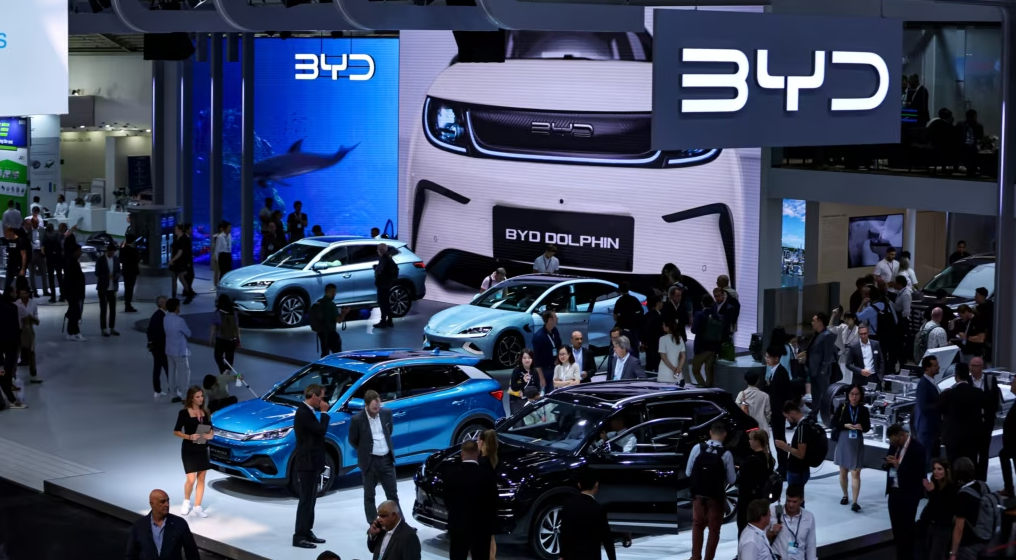
Visitors look at models from BYD, a Chinese auto manufacturer, during an event ahead of the opening of the Munich auto show IAA Mobility 2023.
After an eight-month investigation, the European Union has announced that it will impose tariffs as high as 38.1% on electric vehicles (EVs) from China to offset the unfair advantages created by Chinese government subsidies. In retaliation, China immediately launched an anti-dumping probe into pork imports from the EU. The two sides are now negotiating a solution to the trade dispute in Beijing.
China’s EV industry arose from a government program launched in 2011 to push the country’s automakers in a new direction. Technologically advanced EVs were chosen as the focus for two reasons: to reduce China’s dependence on imported oil, which accounts for more than 70% of total supply and has become a significant national-security concern; and to catch up with the major car-producing countries, which would have been impossible had China continued to produce internal-combustion models. EVs were in their infancy, and no automaker, save for Tesla, had a clear advantage at the time.
To generate domestic demand for EVs, the Chinese central government and many local governments provided purchase subsidies, which are more transparent and distort price signals less than the subsidies it offered for investment in solar-panel manufacturing. The government began to phase out these purchase subsidies in 2018, and eliminated them altogether by the end of 2022.
The success of China’s EV industry is undeniable. EV sales began to surge in 2021, partly because of increased production at Tesla’s Shanghai super factory, which began operating in 2019. Around 3.5 million EVs were sold in the country that year, and sales nearly doubled in 2022. In 2023, a whopping 9.5 million units were sold domestically, accounting for 31.6% of total car sales in the country and 65% of global EV sales, while another 1.77 million were exported. In the first five months of 2024, China sold 3.9 million EVs, a one-third increase over the same period last year.
But Chinese government subsidies alone are not a good reason for the EU to impose countervailing tariffs, even if they did contribute to the rapid growth of China’s EV industry. For starters, major countries – including in Europe – use subsidies widely as a tool for promoting their own industries in this new global environment of fragmentation and supply-chain reallocation. Moreover, EU member states may one day have to resort to subsidies to boost their own domestic green-tech industry.
A better argument for tariffs would require the EU to recognize some fundamental economic logic. Over the last 200 years, winners in the global game of industrial competition have been the strongest proponents of free trade. The German economist Friedrich List understood this in the early nineteenth century and, in his famous book The National System of Political Economy, called on the German states, which faced relentless competition from cheap British goods, to form a customs union and impose 20-40% tariffs to protect domestic manufacturers. In his view, a government had the right to defend its own industry from foreign countries dumping cheap goods in export markets.
This argument has been used to justify protection of infant industries in developing economies. Despite not being in vogue between the 1980s and the 2000s (largely because of the success of the East Asian tigers, which relied on an export-led growth model), the idea has gained traction over the last decade. Many economists who used to be staunch supporters of free trade now favor at least some form of protection.
China, for its part, should take a more nuanced view of the EU’s planned tariffs, not least because its domestic auto industry has benefited from tariff protection. Chinese import duties on cars were extremely high before the country joined the World Trade Organization, and remain substantial today, starting at 25% and increasing incrementally, based on engine size.
More importantly, a tariff of up to 38.1% (though the weighted average duty for producers that cooperated with the EU’s investigation is 21%) is unlikely to substantially affect sales of Chinese EVs in Europe. Chinese EVs cost around 50-100% less than European EVs, and yet are still priced much higher in Europe than they would be in China. An entry-level MG4, for example, sells for €28,486 ($30,464) in Europe, but only around €15,000 in China.
As the global leader in the EV market, China should share the fruits of its growth with the rest of the world. One way to do that is to refrain from retaliating against the EU’s tariffs. This would have the added benefit of giving China a geopolitical advantage in its rivalry with the United States. Europe is an important player in the increasingly fractured global economy, and China should make a concerted effort to win it over.
Copyright: Project Syndicate, 2024.
www.project-syndicate.org